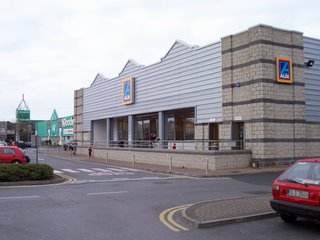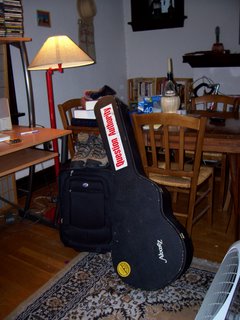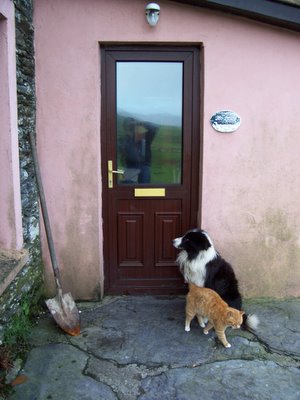Tuesday, January 31, 2006
Portstewart in Occupied Ireland

People have written volumes about the "Troubles" that have plagued Northern Ireland for the last 40 years, and while the political situation here has been ameliorated by the peace accords of a decade ago, vestiges of the sectarian conflict can still be felt here. But on a mild Sunday afternoon in January, the those problems are temporarily put aside in favor of a cruise along the seaside at Portstewart on the north coast.
Cyprus Avenue

I always assumed Van Morrison was singing about "Cypress" Avenue in the song of the same name. But during my brief visit to Belfast, I discovered that the street was named after Cyprus, the island. Morrison's auto-biographical lyrics mention washing windows on the street. My friend and host in Ireland, journalist Robert Allen, also served the wealthy residents of the famed avenue, delivering newspapers here as a child.
Saturday, January 28, 2006
The Price of Orange Juice and Beer

At the Aldi's in the Galway Shopping Center, orange juice sells for $1.29 for approximately the metric equivalent of a quart. In St. Louis, juice costs $1.37 for a half gallon. Given that the dollar is trading at 87 cents against the euro, you can imagine what the price of living is here.
Beer prices are even more pricey. A case of Budweiser, which is made by Guinness under a contract with Anheuser-Busch of St. Louis, costs more than €37.00 for a 24-can case.
Old Europe, New Europe

Along the pier in Galway couples walk together speaking Gaelic, and in the teeming shopping district on Quay Street and adjacent avenues the streets are filled with shoppers. Galway is said to be the fastest growing city in Europe and the average age of its population based on my brief stay here appears to be 20-something.
Kicking the Wall
Kicking the wall is an expression that Galway residents use when referring to taking a power walk along the promenade next to the bay. When you reach the stone wall at the end of the walk you kick it and turn around and head back.
The promenade is also crowded with more casual strollers of all ages. Walkers, however, outnumber runners about 100 to one.
Evidentally, jogging is not as much of an obsession here.
Thursday, January 26, 2006
Bridges
The one-lane stone bridges on Irish roads have a curious way of meeting the road at right angles causing a S-curve at each crossing.
Wednesday, January 25, 2006
The Bright Lights of Garnish

Rural electrification didn't arrive in Garnish until 1970. The electric-powered cable car at Dursey Island came on-line a year before residents were hooked up to the grid. Until that time, locals spent their nights telling tales around the fireplace, especially during the long winter nights. And so it is that my host, 50-year-old Michael "Mitey" McNally Jr., is steeped in folklore, including, not surprisingly, stories of misdeeds of the fairies, who unlike Walt Disney's Tinkerbell, were ornery little supernatural creatures. Above is an image of Mitey's house. The stone portion is approximately 200 years old.
You Say Garnish ...
There are at least two place names for every location in Ireland, one in English and one in Irish or Gaelic. This can be a bit confusing, of course. In the case of the village in which I'm staying, the English spelling is Garnish, while the Gaelic is spelling is Garinish. Most of the time the spellings aren't that closely related.
Then there are the multiple-choice pub names. Under Irish law, pubs must keep the name attached to the building. So D. McCarthy's pub in Youghal, Co. Cork, for example, was previously known as the Imperial Hotal, circa 1700, under British rule. The pub has had at least two incarnations in recent times, with the current owner being Jim Browne.
Monday, January 23, 2006
Everybody's Related Here
The government minister who St. Louisan John Corbett collided with in a car accident last year is the grandson of Eamon De Valera, the first president of the Irish Republic and the only member of the 1916 Uprising who wasn't executed by the British. The reason he was spared is because he was an American.
Road Bowling
On the way back to Garinish from Youghal yesterday, Robert and I encountered an ancient sport that is still played in Ireland called "roading bowling." I haven't learned its rules yet, but the game involves a group of men and boys hitting a ball down the road. Each group of bowlers carries a hand sythe for some reason.
Mutton
A good Irish stew is made with mutton. And Mitey is an expert at cooking one. Since giving up full-time fishing some years back, he has become a sheep farmer. The sheep in these parts graze on the steep hillsides all the way down to the fields that border the sea. Three of Mitey's herd have died in the last six weeks for unknown reasons. We walked out in the field a few days ago to inspect the latest causalty.
Mackerel For Dinner
Soup is on the stove back at Mitey's and mackerel is on the menu tonight caught out of the bay below his house. The waters around West Cork are also fished for pollack, Atlantic salmon and cod. But there are other lesser-known fish here, too, including: the Spotted Dogfish; John Dory or John with the Big Eye; Anglerfish, aka, Monkfish; Wrasse Cuckoo and Conger, an eel.
A posted guide to the bay fish at Garinish had this to say of the Conger: "When landed the conger will thrash and wriggle incessantly. Their bodies are covered with layers of slime and they have row after row of strong teeth."
Seeing My Dead Aunt Katherine
She's everywhere. Around the next corner. Waiting on me in the shop, at the B&B.
Monopoly Money
The Euro may be worth more than the dollar but it looks and feels like Monopoly money. This is not good for the shoestring traveler.
A Word of Explanation
I will be posting short entries without images for now because the computer shop in Castletownbere has a slow dial-up connection.
Second Gear, It's All Right!
Driving the narrow, twisting roads through the mountains of West Cork is a test of anyone's driving skills, especically at night or in rainy conditions. Adding to the risks is the fact that many Irish motorists, like their counterparts in America, drive SUVs such as Nissan Pathfinders or Range Rovers.
Craic
Craic (pronounced crack) is not a drug in Ireland, but a form of fun often associated with drinking and pub life. To have a "bit of craic," is to laugh or enjoy one's self in the company of others, but that, of course, doesn't capture the spirit of the term.
Irish Breakfast
An Irish breakfast, otherwise referred to here as a "heart attack on a plate," consists of a fried eggs, potatoes, aka "spud," and three meats, including rashers (bacon) black pudding (sheep's blood) and sausage.
Wednesday, January 18, 2006
The Enlightment of Sea Gulls
When you live with a fisherman, you eat seafood: fresh haddock, frozen mackerel, Bantry Bay mussels. The mackerel came from Michael "Mitey" McNally's freezer. He caught the fish last fall in the small bay in front of his house. The mackerel congregate there during that time of the year, preparing to swim out into the deep. The fisherman knows when they've arrived because of the hungry gulls who follow the school of fish.
The Pittsburgh Pirates Connection
My host on the Beara peninsula, fisherman Michael "Mitey" McNally, says that the house at the crest of the hill, where the road bends, was the home of the grandfather of the late Dave McNally, famed pitcher for the Pittsburgh Pirates. The baseball star was Mitey's second cousin
Soccer is Soccer in Ireland
According to Irish cultural and sports authority, the word soccer originated in Ireland. The Irish use the word, he says, because they also play a variety of football that predates the American version of the game. This bit of linguistic-athletic trivia has yet to be confirmed from a second source.
Tuesday, January 17, 2006
My Own Episode of 24 Hours, Plus 6
By the time, I arrived in Garirish Cross, down the winding road to Alliheis, I had been on the road approximately 36 hours, the last of those mostly spent manuevering down narrow one-lane roads, driving on the left side of the highway.
I am currently writing from an Internet shop in the town of Castletownbere and will provide more details and photos of my journey when I can find a wi-fi location.
One horticultural discovery, however, is worth noting immediately: palm trees grow here -- 20 feet tall and higher -- in County Cork all year round. Corksmen plant them in their front yards for ornamention like we might cultivate a magnolia.
The Edge of the World
So far west is this strip of land called the Beara Peninsula that the Romans never came here nor the marauding hordes who pillaged the empire. Instead, monks from the early Christian church secluded themselves on an island off this isolated coast, and busied themselves preserving holy texts in intricate detail in what came to be known as illuminations.
Monday, January 16, 2006
Gobsmacked
First news off the plane:
New York Times, Jan. 15:
The Irish have a word for it - gobsmacked - that properly describes the astonishment of Representative Peter King and other Irish-Americans at the news that Denis Donaldson, long a trusted leader in Ireland's rebel movement, has been spying for Britain for decades.
"Don't you remember him?" asked Mr. King, a New York Republican close to the Irish peace process. He was recalling a noisy night 19 years ago at a Belfast social club - a bastion protected by battle-ready guards and barbed wire - where supporters of the outlawed Irish Republican Army drank lager and whiskey and sang rebel songs. Mr. Donaldson was one of the throatiest at our table in singing of Irish liberty and the British yoke. ...
Sunday, January 15, 2006
Hoodlums and Hooligans

It's been said that in Kerry Patch the Irish mob was tougher and more ruthless than anything that their Italian counterparts could muster.
The Great Depression began in the early 1930's. Many companies in St. Louis at the time, had signs at their entrance saying "HELP WANTED -- NO IRISH NEED APPLY"for work. So it’s understandable why many young Irish lads turned to the mob in order to squeeze out a living.
The Irish that ran the north side of St. Louis and all of Kerry Patch for many years did so from the brick layer's union. Almost the entire city of St. Louis, buildings and streets were built with bricks. Two of the main principal politicians were Tony Denny and Matt O'Neal. Matt was the committeeman for the 27th ward and controlled the jobs that everyone wanted and needed. Tony Deny was the Recorder of Deeds of St. Louis.
But the Irish from Kerry Patch and another area, centered around the intersection of present-day Hampton and Manchester, then called Cheltenham and now known as Dogtown were not only hoodlums and hooligans. Many played significant roles in the development of area businesses, hospitals, schools, the Catholic Church, and even the game of soccer.
Saturday, January 14, 2006
St. Louis' Kerry Patch

Athlone Avenue in North St. Louis, which is named after an Irish town, is lined with stately residences from the turn of the last century. But less affluent Irish immigrants called the nearby "Kerry Patch" home.
William Marion Reedy, St. Louis' brightest literary light, was born in the Kerry Patch, the city's Irish ghetto, in 1862. A newspaperman by trade, Reedy also published Reedy's Mirror from the early 1890s until his death in 1920. During that time, the literary magazine gained a national reputation for publishing leading poets, including T.S. Eliot, Ezra Pound, Vachel Lindsay, Sara Teasdale, Edna St. Vincent Millay, Carl Sandburg and Edgar Lee Masters.
The accompanying image shows the plaza in front of St. John's Catholic Church on Chestnut Street downtown, where a Celtic cross was recently erected to honor Irish immigrants' contribution to the building of St. Louis.
Thursday, January 12, 2006
I Play the Fox

Pondering the weighty matter of my pending trip to Ireland, the word "shenanigans" came to mind. An appropriate Irish word, I thought, one that provided levity to my gathering angst. Though the word may have quelled my concerns, it is, alas, of American origin, having first appeared in print in the mid-19th Century in San Fransisco around the time of the California Gold Rush, according to the Oxford English Dictionary. Nevertheless, shenanigans, and the mischief it denotes, may very well have been inspired by the Irish. According to Webster's New World Dictionary, Fourth Edition, the word is possibly derived from the Gaelic term "sionnachuighim." Translation: I play the fox.
Wednesday, January 11, 2006
Circling Over Shannon

In some circles, Ireland's Shannon airport is known as the "Warport," because the facility provides logistical support for the U.S. military. The Irish peace movement has used the airport as the focal point of its protests for years now. I will be landing there next Monday. Searching Google for an appropriate image of the anti-American sentiment that awaits me, I stumbled across the accompanying photograph that -- by no small coincidence -- is already archived at my longstanding blog, Media Mayhem. It's a small world and a smaller blogosphere, mates.
Tuesday, January 10, 2006
These Boots Are Made in China

In preparations for my Irish odyssey, I've had to make a few acquisitions, including a digital camera, the modern incarnation of the old Kodak Brownie Hawk Eye of my childhood. Just as important, as shown in the accompanying image, are comfortable hiking boots and one of those fancy suitcases with wheels, the better for toting through miles of airport concourses. All three items, of course, are made in Red China. Remember when right-wingers all called it Red China? You seldom hear that phrase nowadays. I'm sure walking around with all this commie paraphernalia won't draw undue attention from the guardians of Homeland Security, but the decades-old bumper sticker on my guitar case might.
Living on Belfast Time
The overly observant reader may have noticed a discrepancy in the time signature at the bottom of my first posting. Be advised I've already moved my internal blogger's clock forward to reflect nightfall in Ireland, jumping time zones in a single click, vaulting into the uncertain future of a Celtic winter.
The Beckoning Road

Call it my winter vacation or an anxiety-ridden exile, it all begins Sunday, 15 Jan. Over the course of the next five weeks, I will be posting regularly from the tip of Ireland's Beara peninsula in the southwest to the troubled streets of Belfast, where my itinerary includes a stay at the Europa Hotel, which has the distinction of being the most bombed hotel outside of the Mideast. During my travels, I'll also chronicle the gonzo exploits of my host and tour guide, Irish journalist and author Robert Allen.
Above is the starting point, my flat in the Irish-American neighborhood of Dogtown in St. Louis, Missouri.




